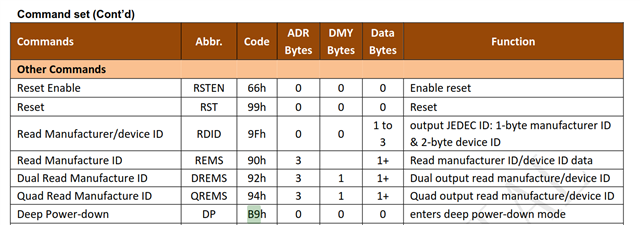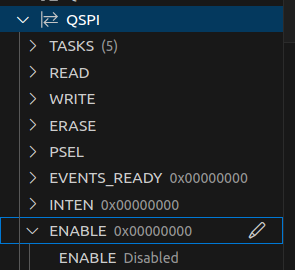My board (nrf52840 sense) has flash memory P25Q16H. When I put everything off, the board consumes 25uA. To save the last bit of current I would like to put the flash memory to deep sleep.
spi_flash_dev = DEVICE_DT_GET(DT_ALIAS(spi_flash0));
if (!device_is_ready(spi_flash_dev)) {
LOG_ERR("%s: device not ready.\n", spi_flash_dev->name);
return ENODEV;
}
if(pm_device_action_run(spi_flash_dev, PM_DEVICE_ACTION_SUSPEND)) { //only consumes more power, 3mA ?!
LOG_ERR("could not suspend qspi flash device %s", spi_flash_dev->name);
}
In the debugger, eventually this function in file nrf_qspi_nor.c is executed:
#ifdef CONFIG_PM_DEVICE
static int enter_dpd(const struct device *const dev)
{
if (IS_ENABLED(DT_INST_PROP(0, has_dpd))) {
struct qspi_cmd cmd = {
.op_code = SPI_NOR_CMD_DPD,
};
uint32_t t_enter_dpd = DT_INST_PROP_OR(0, t_enter_dpd, 0);
int rc;
rc = qspi_send_cmd(dev, &cmd, false);
if (rc < 0) {
return rc;
}
if (t_enter_dpd) {
uint32_t t_enter_dpd_us =
DIV_ROUND_UP(t_enter_dpd, NSEC_PER_USEC);
k_busy_wait(t_enter_dpd_us);
}
}
return 0;
}
#endif /* CONFIG_PM_DEVICE */
SPI_NOR_CMD_DPD is indeed to 0xB9, which is consistent with the datasheet.


Problem: after executing this command, the power rises to 3.94mA. I have no idea what is causing this.
I'm running zephyr 3.5.99 ncs 2.6.1



